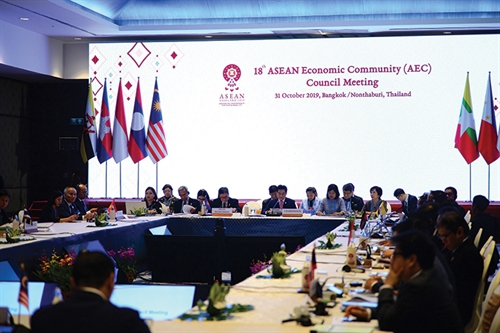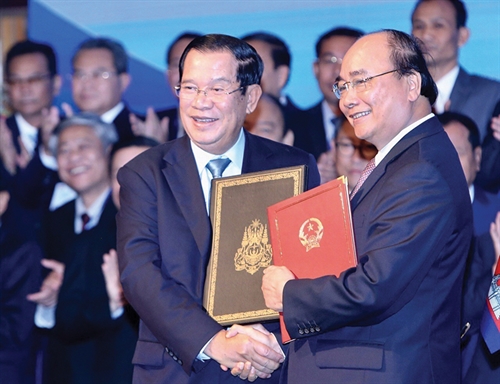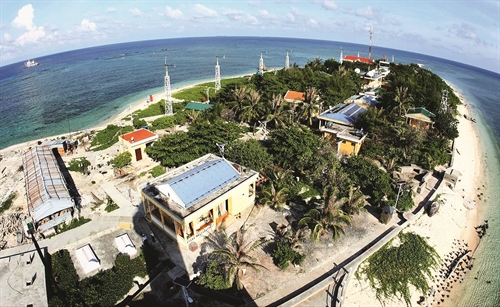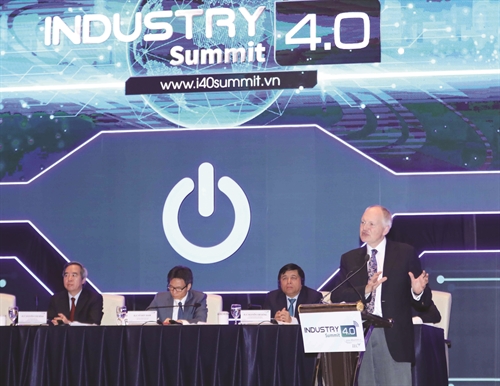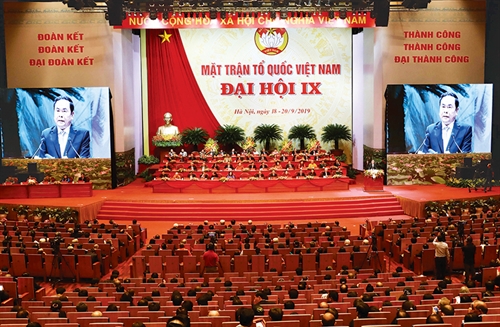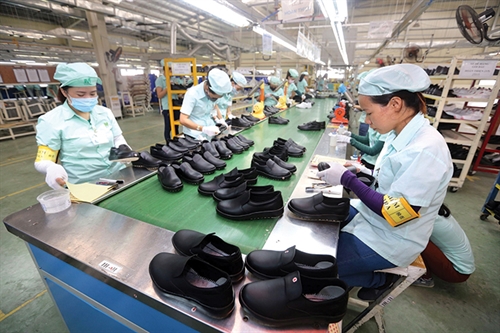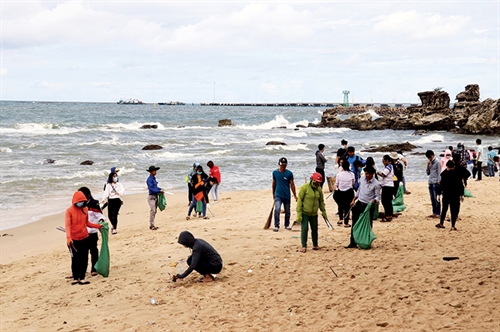The 14th National Assembly (NA) on November 11 adopted the Resolution on the socio-economic development plan for 2020, striving for 6.8 percent GDP growth rate and higher national competitiveness.
The voting was held during the NA’s 8th session, which closed on November 27 after the month-long sitting.
Vu Hong Thanh, Chairman of the NA Committee of Economic Affairs, said the 6.8 percent growth rate was quite reasonable, ensuring the harmony between the need for economic growth and inflation control.
The resolution’s main goals are to maintain the macroeconomic stability, keep inflation under control, and raise productivity, efficiency, resilience, and competitiveness of the economy, while creating a fair and open business investment environment.
The legislative body also demanded the Government and related agencies reserve resources for climate-resilient programs and for preventing the worst impacts of climate change and natural disasters, to which Vietnam is among the world’s most vulnerable countries.
According to the resolution, the consumer price index increase will be below 4 percent; exports are set to grow by 7 percent in 2020 but the economy will still experience a trade deficit, with the export value growth trailing behind the import value growth by about 3 percent.
Minister of Industry and Trade Tran Tuan Anh said that due to the ongoing US-China trade war and the upcoming ratification of the EU-Vietnam Free Trade Agreement, there would be an influx of foreign investment in Vietnam, leading to higher imports of machinery, equipment and materials.
His ministry estimated that the import growth in 2020 will be around 8-10 percent, while the export growth will reach 6-7 percent.
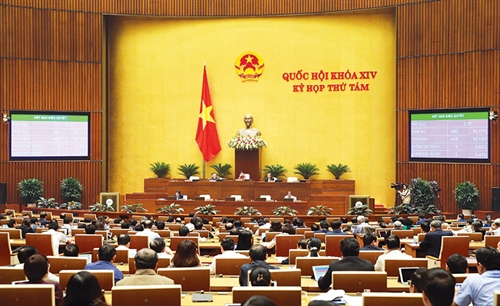 |
| National Assembly deputies pass the amended Securities Law on November 26__Photo: Doan Tan/VNA |
The NA also asked for accelerated implementation of national key infrastructure projects, including the North-South expressway, the Long Thanh international airport in southern Vietnam, and other major projects aimed at boosting regional connectivity.
Regarding social targets, the resolution says that development capital will account for 33-34 percent of GDP, while the rate of poor households, delineated by the multidimensional poverty approach, will fall by 1-1.5 percent (or 4 percent in mountainous households).
The rate of trained laborers will reach 65 percent, of whom 25 percent hold higher-education degrees and certificates.
The State-sponsored health insurance’s coverage is expected to reach 90.7 percent of the population, with the number of patient beds per 10,000 residents reaching 28 (up one compared to the 2019’s figure).
Tying in with the resolution’s target of reaching forest coverage of 42 percent, the Government is told to expend all efforts to maintain the existing natural forest areas and improve the environmental management.
The rate of industrial parks having wastewater treatment systems must reach 90 percent, according to the resolution.
Regarding foreign affairs, the resolution listed such objectives as performing the duties that come with the chairmanship of the Association of Southeast Asian Nations and the non-permanent member of the United Nations Security Council when Vietnam holds these two positions next year.
The resolution also stressed the upholding of territorial sovereignty and maintenance of peace and stability as a foundation for economic development.
Laws passed
During the session, the NA passed 11 laws including those concerning labor; exit and entry of Vietnamese citizens; and foreigners’ entry in, exit from, transit through and residence in Vietnam.
According to the revised Labor Code, the retirement age will be adjusted according to a roadmap until male workers reach 62 years by 2028 and female workers reach 60 years by 2035.
Specifically, Article 169 of the revised Code says that from 2021, the retirement age will be full 60 years and three months, for men, or full 55 years and four months, for women. Such age will then rise by three months or four months every year, for male workers or female workers, respectively.
Unless otherwise prescribed by law, the retirement age may be reduced by no more than five years against the abovementioned age for workers suffering working capacity decrease; workers doing heavy, hazardous or dangerous jobs or extremely heavy, hazardous or dangerous jobs; and workers in localities with extreme socio-economic difficulties. Such age may be increased also by no more than five years for employees with high technically professional qualifications and in some special cases.
The revised Code has 10 new articles applicable to employees and six others applicable to employers.
For employees, it has for the first time included non-contractual workers in its subjects of application. It also provides for the establishment of employees’ organizations at enterprises which do not belong to Vietnam’s trade union organizations, and the protection of juvenile workers.
With regard to employers, the Code has for the first time ever mentioned the representation role of employers’ representative organizations. Another new provision is that the State will not intervene into salary policies of enterprises.
The Law on Exit and Entry of Vietnamese citizens would allow passport applicants to submit their information online and receive passports later, instead of having to show them up at immigration offices.
Notably, Vietnamese citizens aged over 14 years could opt to have their passports embedded with electronic chips that would allow them to make use of the automated self-service.
The new law would require a separate passport for each individual, in contrast to the current regulations under which an under-9 person will have to share a passport with their parents.
Meanwhile, amendments to the Law on Foreigner’s Entry in, Exit from, Transit through and Residence in Vietnam would allow foreign visitors to change their visa status and prolong their stays in Vietnam without having to fly out of the country.
Visitors who can prove they are investors or representatives of foreign organizations that make lawful investment in Vietnam will be allowed to have their purpose of visit switched during their stay in the country. Family members of invitees will also enjoy the same advantage.
Foreign workers who receive job offers in Vietnam or enter the country on e-visas will be able to change their visa status as long as they have a work permit or a certification that they are eligible for a work permit.
The amendments mark a huge change in policy, as foreign guests currently have to fly out of the country if they want to renew their visas.
Vo Trong Viet, Chairman of the NA Committee on National Defense and Security, said the amendments would make it easier for foreigners to stay in Vietnam to learn about the market, and look for jobs and investment opportunities without wasting time and money on immigration procedures.
“The regulation is open but also strict about monitoring foreigners living in Vietnam. Not all tourists that visit Vietnam can apply for a change of purpose given the particular conditions (for a visa switch),” Viet said.
Other eight laws passed at this session include those pertaining to library; organization of the Government and local administrations; mobilized reserve forces; management and use of weapons, explosives and supporting tools; cadres, civil servants and public employees; militia and self-defense forces; securities; and state audit.
The NA also adopted several resolutions on state budget estimates for 2020; allocation of central budget funds for 2020; master plan on socio-economic development in ethnic minority, mountainous and extreme difficulty-hit areas; feasibility study report on the project to build Long Thanh international airport, phase 1; judicial work; freezing of tax arrears or write-off of late-payment interests or fines for financially incapable taxpayers; and pilot non-organization of People’s Councils in wards of urban districts and towns of Hanoi, among others.-
